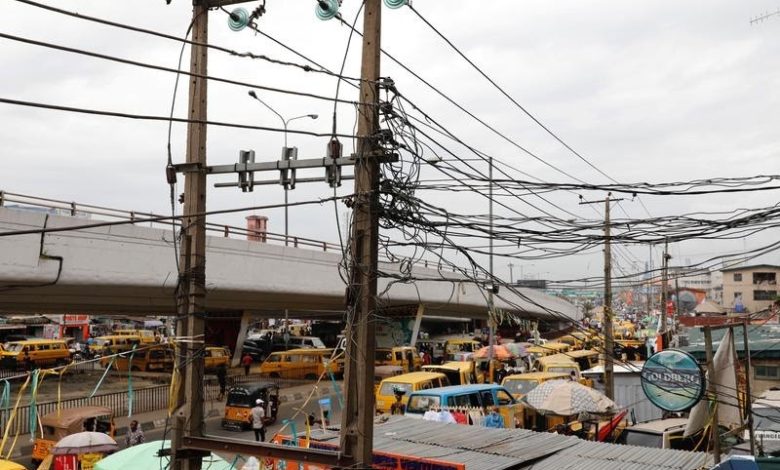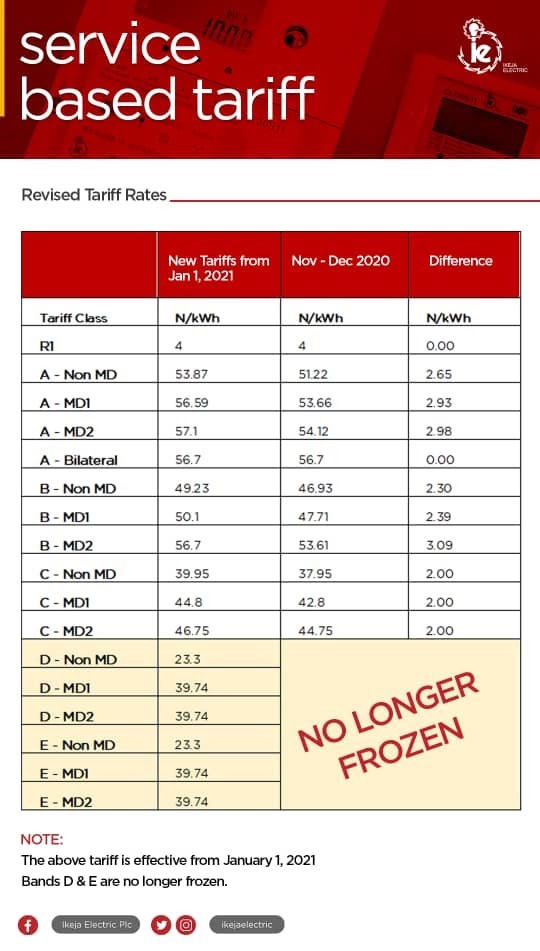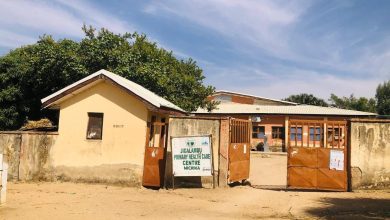Are Nigerians Ready For The New Electricity Tariff Plan?

The recent tariff increase by the Nigerian Electricity Regulatory Commission (NERC) has made a lot of Nigerians worried over the financial implications.
This new tariff plan is the result of months-long conversations between the federal government and stakeholders on the power supply chain. The implementation plan includes the removal of subsidy and allowing the tariff to be based on cost-reflective service with the belief that this plan will bring about economic growth.
Last year, the Nigerian Electricity Regulatory Commission (NERC) announced that it had begun a review that would birth the emergence of a Cost Reflective Tariff (CRT) as from January 2021.
This means that users pay based on the hours of electricity received per day and dependent on the market value. It increases the rates of most tariff classes and exempts low power consumers.
NERC declared on its official Twitter handle that it had to review the rates for service bands to reflect the partial impact of inflation.
“In compliance with the provisions of the EPSR [Electric Power Sector Reform] Act and the nation’s tariff methodology for biannual minor review, the rates for service bands A, B, C, D and E have been adjusted by NGN2.00 to NGN4.00 per kWhr to reflect the partial impact of inflation & movement in forex,” the agency said.
The price of electricity tariffs was subsidised by the government until November 2020 when the government could not keep up with their side of the bargain because of the economic implication.
The Minister of Finance, Zainab Ahmed, and the Central Bank of Nigeria (CBN) Governor, Godwin Emefiele, last year in a joint letter hinted that Nigerians would pay the full cost of their electricity consumption in 2021.
However, on Thursday, Senior Special Adviser on Media and Communications to the Minister of Power, Aaron Artimas, announced that the government had directed distribution companies and NERC to fall back on the old tariff that was applied in December. This is going to last, he said, till the government works out a plan with the Labour Committee later in January.
He added that the government was still funding 55 percent of the bills of economically disadvantaged consumers under bands D and E.
Nigerians react to the increase
Nigerians are not happy about the previously announced tariff increase as many people have yet to recover from the financial hardship imposed by the COVID-19 pandemic and lockdown. They took to Twitter to show their displeasure.
“How can a sane government increase electricity tariff in the middle of a pandemic? This government,” tweeted Seyi (@ Seyi_OG) on Tuesday.
“Can’t stop thinking about the many ways Nigeria keeps trying to kill us or pull us back. Now, another increase in electricity tariffs. People are struggling so hard as it is. Why?” another Twitter user, Ohotu (@_ohotu_) asked the same day.
Chinonso Bobby Egemba, a health advocate popularly known as Aproko Doctor, said the government should not continue to raise the prices of commodities without improving the people’s purchasing power. “Prices are increasing in Nigeria faster than Nigerians can afford them,” he noted.
Freelance investigative journalist Fisayo Soyombo commented on the denial by NERC of a 50 per cent increase. “Who are you deceiving? But you ‘adjusted the rates for service bands A, B, C, D and E by NGN2.00 to NGN4.00 per kWhr’,” he wrote.
There are different classes of electricity tariffs. Residential (R1) is for people, such as those in rural areas, who consume very low electricity because they do not use heavy appliances.
Band A Maximum Demand (MD) is for electricity users with private transformers such as huge companies, and Non-Maximum Demand is for regular residential people, with two to three phases while MD1 and MD2 are for large manufacturing companies.
This set of people are supposed to be having up to 20 hours of power supply and as of November, they were paying N51.22 N/KWH. With the new tariff, however, they are now expected to pay N53.87–a difference of N2.65.
These classes of tariff plan have different increments and only R1 residents were not affected. Band B and C have a difference of 2 naira increase in tariff plan. Band B is given 16 hours of light or more, Band C is given 12 hours of light, Band D 8 hours of light and above, and Band E 4 hours of light and above. Band A has the highest tariff increase, followed by band B, and so on.
Does subsidy removal help the economy?
Public analyst and lecturer at the Olabisi Onabanjo University, Ago-Iwoye, Prof Olawale Ajayi, while explaining the implications of the removal of subsidy by the government told Arise TV, that “it was believed that deregulation would allow market forces to determine the price and improve efficiency”.
“It happened in the telecom industry. The government was in charge when services were very poor, but when the private sector came in, telephony became available, cheaper and accessible, and also contributed to developing the economy,” he said.
He insisted that a similar move in the power sector will help grow the economy of Nigeria, adding that the government cannot keep paying subsidies anyway with the recession.
Some are of the belief that the removal of electricity and petroleum subsidies will generate more revenue for the government. The impact on people cannot be excused.
With businesses depending on power generators for electricity, the government and generating companies are expected to ensure the new plan comes with improved power supply that is worth the pay.
Support Our Journalism
There are millions of ordinary people affected by conflict in Africa whose stories are missing in the mainstream media. HumAngle is determined to tell those challenging and under-reported stories, hoping that the people impacted by these conflicts will find the safety and security they deserve.
To ensure that we continue to provide public service coverage, we have a small favour to ask you. We want you to be part of our journalistic endeavour by contributing a token to us.
Your donation will further promote a robust, free, and independent media.
Donate HereStay Closer To The Stories That Matter





